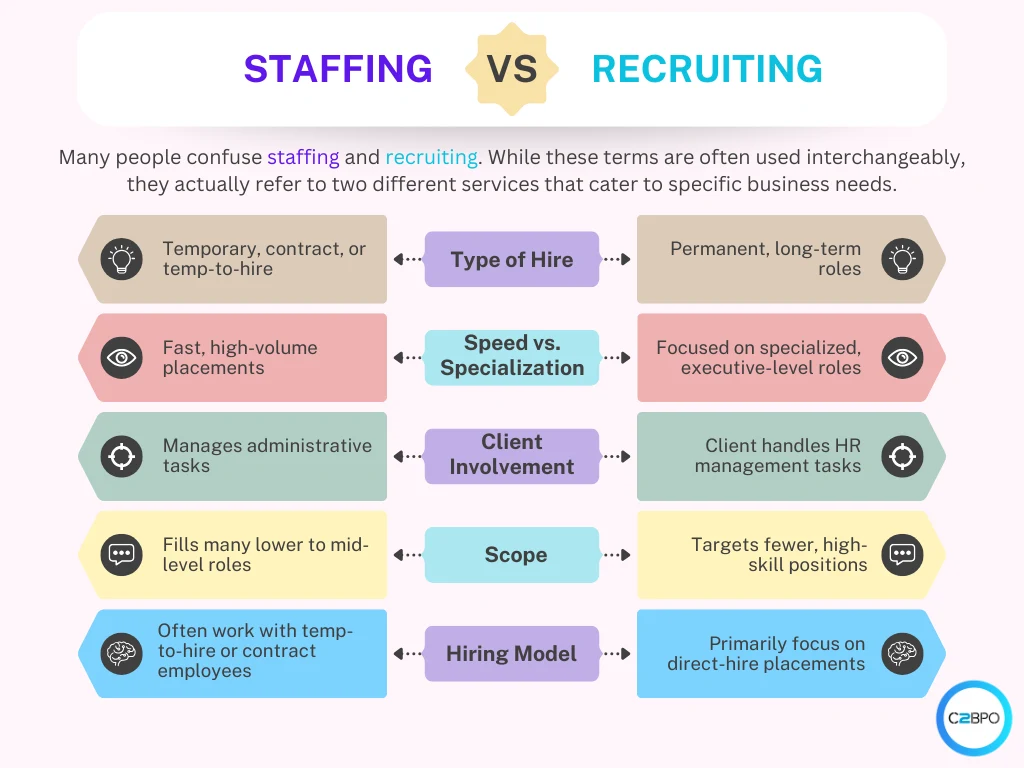Finding the right talent is key to a company’s success, but figuring out the difference between staffing and recruiting can be tricky. Even though people often use these terms interchangeably, they refer to two different services that cater to specific business needs. Let’s take a closer look to make it clear: Staffing vs. Recruiting.
Here at Connect2BPO, we do offer both of them services, but let’s take the time to explore the differences between staffing and recruiting, and guide you toward understanding which option fits your company best.
What Is Staffing?
Staffing is the process of finding and hiring temporary or permanent employees to fill positions within an organization, this is the key information. This process is typically handled by a staffing agency, which specializes in matching candidates to jobs based on skill sets and company needs. Staffing agencies play a key role in industries that require a high volume of labor or short-term workforce solutions, such as manufacturing, healthcare, customer service, and seasonal businesses.
What Does a Staffing Agency Do?
A staffing agency acts as an intermediary between companies looking for workers and individuals seeking employment. They help businesses by:
- Understanding workforce needs: Staffing agencies work with employers to determine their immediate and long-term hiring requirements.
- Sourcing candidates: These agencies maintain a pool of candidates to fill roles quickly, particularly for short-term or temporary positions.
- Screening and vetting applicants: They handle background checks, reference checks, and interviews to ensure the candidates meet the employer’s criteria.
- Managing employee onboarding: Staffing agencies often take on administrative tasks like payroll, benefits, and compliance for the workers they place.
- Handling temporary staffing: A common service of staffing agencies is to provide temporary workers, who may later transition to permanent roles if they meet the company’s expectations.
Staffing agencies also, provide valuable support in industries where labor needs fluctuate. By offering temporary and temp-to-hire employees, businesses can scale their workforce based on demand.
Staffing KPI (Key Performance Indicators)
Certain key performance indicators (KPIs) are used to measure the effectiveness of staffing services. These metrics help businesses evaluate the impact of their staffing decisions. Common staffing KPIs include:
- Time to fill: The average time it takes to fill a vacancy.
- Quality of hire: Measured by the performance and retention of the candidates placed by the staffing agency.
- Cost per hire: The total cost involved in filling a position.
- Fill rate: The percentage of job orders successfully filled by the staffing agency.
- Turnover rate: The percentage of employees who leave the company after being hired through the staffing agency.
Keeping an eye on these KPIs helps you see how well a staffing agency is performing, making it easier for businesses to make smart, data-backed decisions.

What Is Recruiting?
Recruiting refers to the process of identifying, attracting, interviewing, and hiring candidates for long-term positions within a company. Unlike staffing, which can focus on temporary roles, recruiting typically targets permanent, full-time roles. Recruitment firms specialize in sourcing candidates for specific industries, roles, or skill sets, aiming to find the right match between the company’s needs and the individual’s qualifications.
What Does a Recruitment Firm Do?
Recruitment firms, also known as headhunters or executive search firms, work closely with businesses to find candidates for permanent positions, sometimes under the Employer of record way. Their services include:
- Understanding the employer’s needs: Recruitment firms partner with businesses to get a deep understanding of the company’s culture, values, and role requirements.
- Proactive candidate sourcing: Rather than relying on a pool of job seekers, recruitment firms actively search for top talent, often reaching out to passive candidates (those who are currently employed but may be open to new opportunities).
- Screening and interviewing: Recruitment firms handle the initial screening, interviews, and sometimes skills assessments to ensure candidates are well-suited for the role.
- Managing negotiations and offers: They assist with salary negotiations and the offer process, helping ensure both the company and the candidate are satisfied with the terms of employment.
- Executive recruitment: Specialized recruitment firms may focus on filling senior or executive positions, requiring a more targeted approach to finding the right fit.
Recruitment firms tend to focus on filling high-skill, long-term roles, making them ideal for organizations looking to invest in top talent and leadership.
Difference Between Staffing Agencies and Recruiters
Though staffing agencies and recruitment firms both play roles in hiring, they differ significantly in their approach, focus, and services. Here’s some differences between staffing agencies and recruiters (Staffing vs Recruiting):
Type of hire: Staffing agencies typically focus on temporary, contract, or temp-to-hire roles, while recruitment firms target long-term, permanent positions.
Speed vs. specialization: Staffing agencies prioritize speed and efficiency in filling positions, often working in industries with high turnover. Recruitment firms, on the other hand, prioritize finding specialized or executive-level candidates and may take longer to fill these roles.
Client involvement: Staffing agencies manage many administrative tasks, including payroll and benefits, for temporary workers. In contrast, recruitment firms focus solely on finding the right candidate, leaving HR management tasks to the employer.
Scope: Staffing agencies generally fill a higher volume of roles, often lower to mid-level positions, while recruitment firms are used for high-skill, niche, or executive roles.
Both staffing and recruitment services are valuable but serve different functions depending on your business’s workforce needs.
Direct Hire vs. Staffing Agency
When comparing direct hire and staffing agency services, it’s important to understand how they differ in relation to staffing and recruitment. Direct hire typically refers to the process of hiring an employee directly into a company’s permanent workforce, with the company fully responsible for the hiring process, onboarding, and employee management. This approach is often used for long-term roles or positions that require specific expertise.
On the other hand, staffing agencies focus on providing temporary or temp-to-hire employees. The staffing agency manages most of the hiring process, including sourcing candidates, handling administrative tasks like payroll, and offering short-term workforce solutions. For companies needing flexibility or quick hires, staffing agencies can fill positions rapidly without the long-term commitment or the full administrative burden on the employer.
The key distinction here is that direct hire involves committing to an employee from the outset, while staffing agencies offer a more flexible solution, often starting with temporary employment that can transition into a permanent role if needed. Companies that need to fill permanent, highly specialized roles might favor direct hiring, while businesses with fluctuating or short-term needs may benefit from working with a staffing agency.
Staffing and Recruitment Companies: Which Fits Perfect for My Business?
Before deciding between staffing and recruitment, think about your company’s hiring needs. Do you need people for long-term or temporary roles? Are you hiring a lot of people or just a few? Do you have HR support to handle the details, or would you need help with that too?:
- Short-term vs. long-term roles: If your business requires flexibility in its workforce or has seasonal demands, a staffing agency may be the right fit. They can quickly fill temporary roles, ensuring you meet operational demands without overcommitting to long-term hires.
- High-level vs. entry-level positions: For specialized roles or senior leadership positions, a recruitment firm is likely the better choice. Recruitment firms are skilled at identifying candidates with the specific expertise and experience needed for these higher-level roles.
- Administrative support: If your business wants help managing HR-related tasks for temporary employees, such as payroll and benefits, a staffing agency is a good option. If you only need help sourcing candidates, a recruitment firm will be a better partner.
- Volume of hires: Companies that need to fill many roles quickly, particularly in industries with high turnover, benefit from staffing agencies. If your business is hiring fewer, more specialized employees, a recruitment firm’s tailored approach will serve you better.
Ultimately, the decision comes down to your company’s immediate and long-term hiring strategy.
FAQs
1. What Is the Difference Between Staffing and Recruitment Agency?
A recruiting firm focuses on sourcing candidates for long-term, permanent roles, often specializing in high-skill or executive-level positions. In contrast, a staffing agency primarily supplies temporary or temp-to-hire workers, managing administrative tasks such as payroll and benefits for these employees.
2. What Is Staffing and Recruiting Industry?
The staffing and recruiting industry refers to businesses that specialize in helping organizations fill positions by sourcing, vetting, and placing candidates. The industry encompasses a wide range of services, from providing temporary workers to sourcing executive talent for permanent roles.
3. Is Talent Acquisition and Staffing the Same?
No, talent acquisition is a broader strategy that focuses on long-term hiring needs, often for specialized or leadership positions. Staffing, on the other hand, typically deals with short-term or immediate hiring needs, particularly for temporary or contract roles.
4. What Is Talent Acquisition Also Known As?
Talent acquisition is often referred to as recruitment, particularly when discussing the process of sourcing, interviewing, and hiring candidates for long-term or specialized roles. However, talent acquisition is considered more strategic, focusing on future workforce planning and building a talent pipeline.
5. RPO vs Staffing
RPO (Recruitment Process Outsourcing) handles the entire recruitment process for a company, focusing on long-term hiring needs. Staffing, on the other hand, provides temporary or short-term workers, often for immediate roles. RPO is a more strategic, ongoing solution, while staffing is typically for quick, short-term fixes.
Staffing vs Recruiting Conclusion
To wrap it up, both staffing and recruiting have their place, but which one you choose really depends on what your business needs. Staffing agencies are great for filling temporary roles fast or giving you flexibility while recruiting firms are better for locking down long-term, specialized talent. Knowing when to go with direct hire, a staffing agency, or even RPO can help you make smarter decisions that fit your company’s goals. Whether you’re after quick hires or top-tier talent, there’s a solution out there to match your needs and help your business grow.
Ready to find the right talent for your team? Contact us today to discuss your staffing and recruiting needs!



